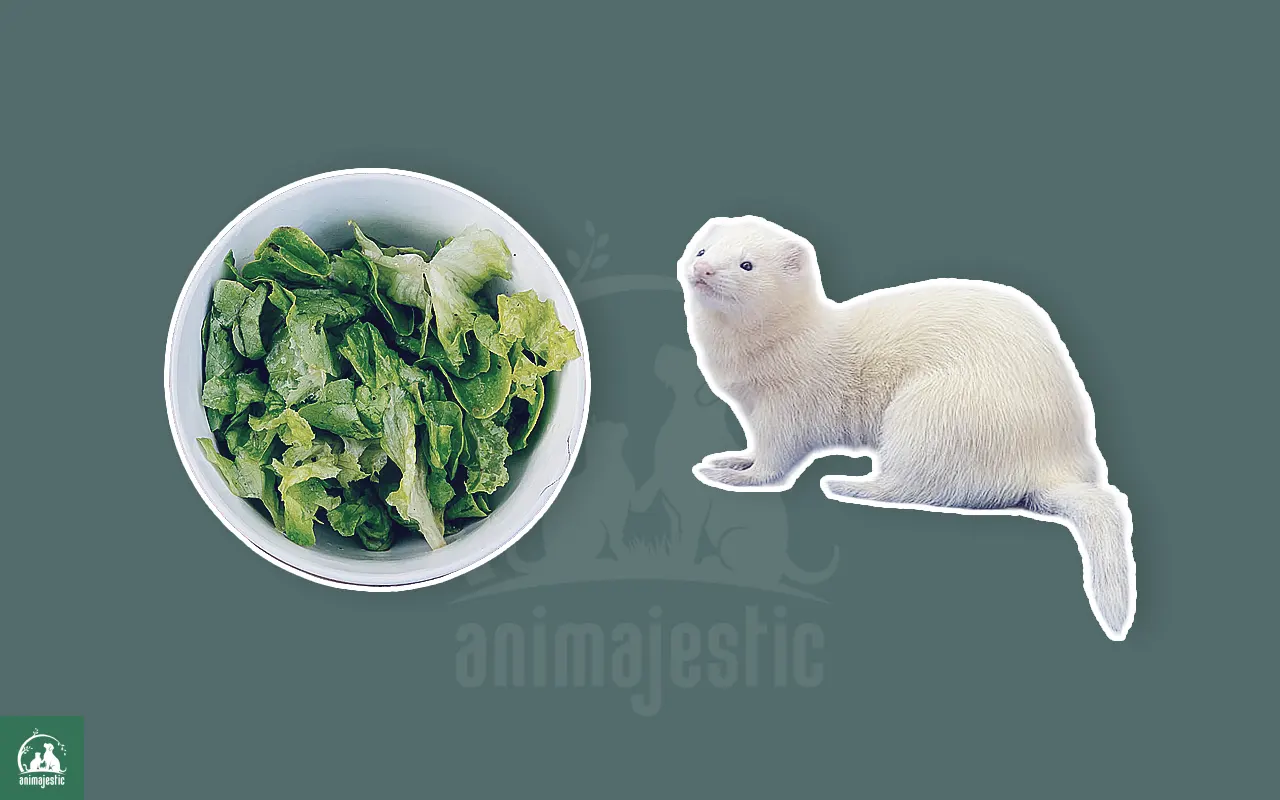As loving and diligent pet owners, we often wonder if specific human foods are safe for our pets to consume. With ferrets, there can be ambiguity about whether certain fruits, vegetables, or other types of food are suitable for their diet.
This article will educate you on the topic of nutrition and if ferrets eat lettuce or not. So, if you’re a ferret owner or aspiring to be one, consider this a must-read guide to keep your furry companion healthy and happy!
Let’s dive into it.
Can Ferrets Eat Lettuce?
The answer to the question is NO. The reasons for this will be explained in depth, but first, it’s important to understand the obligate carnivorous nature of ferrets and their unique digestive systems.
A Closer Look at the Ferret’s Digestive System
A deeper appreciation of ferret biology sheds light on why certain food types aren’t suitable for them.
Ferrets have short gastrointestinal tracts, with a food transit time of merely 3 to 4 hours (from ingestion to excretion), which makes it challenging for them to digest plant fibers.
Their bodies have evolved to get energy and nutrients from high-protein, low-fiber foods, typically derived from animal sources.
Obligate Carnivores and Their Impact on Ferret Diets
In the wild, ferrets are obligate carnivores, preferring to feed on smaller animals like mice or rabbits. This diet consists of proteins, fats, and only a negligible amount of carbohydrates and fibers.
To nurture and maintain a ferret’s overall well-being, the optimal diet should emulate their natural dietary patterns.
The Fundamentals of Ferret Nutrition
Now that we understand the importance of high-protein, low-fiber diets for ferrets, let’s address the role of lettuce in their diet and its suitability.
The Nutritional Composition of Lettuce
Lettuce is a vegetable low in calories, moderate in fiber, and high in water content. However, it doesn’t offer substantial nutritional value in terms of proteins or fats, which are essential components of a ferret’s diet.
The Undesirability of Lettuce as a Ferret Diet Component
As mentioned above, ferrets need high-protein, low-fiber diets to meet their nutritional needs. Lettuce, by contrast, is high in fiber and relatively low in nutrients, making it far from ideal for ferrets. Furthermore, the high water content in lettuce may contribute to diarrhea if ingested by ferrets.
What If My Ferret Accidentally Eats Lettuce
Although it’s important not to offer lettuce to your ferret, consumption of a small amount is not usually cause for concern. However, if a ferret consumes a sizeable portion of lettuce, it’s advisable to contact your veterinarian for guidance.
The Potential Risks of Feeding Lettuce to Ferrets
Although it may seem innocuous, feeding lettuce to ferrets can pose potential health risks.
The high fiber and water content in lettuce can cause diarrhea, and its indigestibility may lead to gastrointestinal discomfort or blockages.
To be on the safe side, it’s best to avoid offering lettuce to ferrets.
Healthier Ferret Food Alternatives to Lettuce
As a health-conscious ferret owner, you may want to consider providing your fuzzy friend with an improved, varied, and balanced diet that complements the protein and fats found in animal-based foods.
Making Better Choices for Your Ferret’s Diet
To provide your ferret with an adequate diet, focus on animal-based proteins found in whole prey, organs, or high-quality, raw, or cooked meats such as chicken, lamb, beef, or fish (like salmon or tinned tuna).
This reinforces your pet’s carnivorous nature and helps them maintain appropriate energy levels, muscle mass, and overall health.
Eggs and Ferret Diets
Occasionally, you can consider adding eggs to your ferret’s diet as well. Eggs are packed with proteins, fats, and vital nutrients like choline and biotin.
Giving your ferret a cooked or raw egg once a week can supply them with these essential nutrients, while also adding variety to their meals.
The Ideal Feeding Regimen for Your Ferret’s Health
A properly balanced and portioned diet can make a noticeable difference in your ferret’s overall health and well-being.
Maintaining consistent mealtimes and portioning the right amount of food can promote optimal nutrient absorption, weight management, and digestion.
Regular Vet Checkups for Ferret Diet
Visiting your veterinarian regularly is essential for keeping tabs on your ferret’s health and dietary needs. As your ferret grows and its nutritional requirements change, checking in with a veterinarian can provide you with tailored advice on optimal diets for your pet’s current life stage.
Responsible Snacking for Ferrets
While ferrets aren’t known for their dental prowess, chewing on animal bones or other approved dental treats can aid in promoting dental health and provide mental stimulation.
It is crucial, however, to choose snacks wisely and avoid any processed meat products that tend to be high in sodium, sugar, or artificial additives.
Our Conclusion
While the idea of snacking on lettuce may be a healthy choice for humans, it is not appropriate for ferrets due to their evolutionary adaptations as obligate carnivores.
To ensure the optimal health and longevity of your furry friend, it’s advisable to prioritize animal-based proteins and fats and steer clear of lettuce and other high-fiber foods.
A consistent and responsible approach to feeding will help build a strong foundation for your ferret’s health, happiness, and a lasting bond with their human caregivers.
